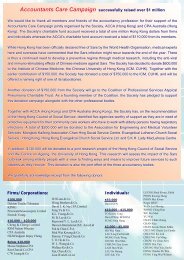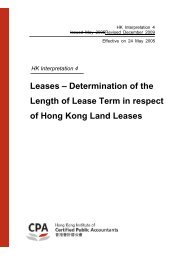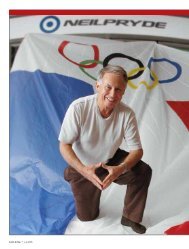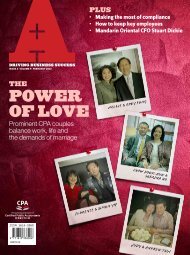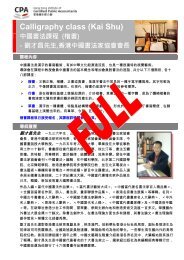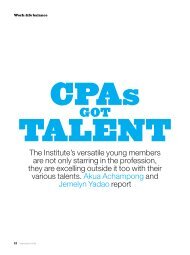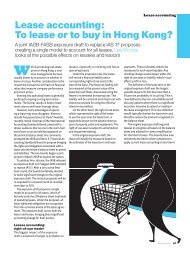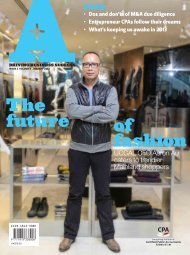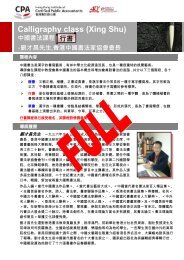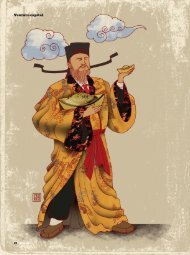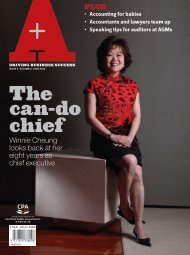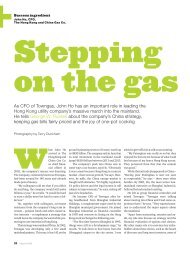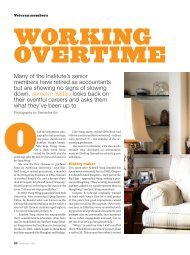Adventurous voyage
Adventurous voyage
Adventurous voyage
You also want an ePaper? Increase the reach of your titles
YUMPU automatically turns print PDFs into web optimized ePapers that Google loves.
+26<br />
Evolving profession<br />
An adventurous<br />
<strong>voyage</strong><br />
Tavis Lam takes<br />
a look at how<br />
the accounting<br />
profession and<br />
the Institute have<br />
evolved over the<br />
past decade<br />
Setting sail on a new journey is<br />
always an adventure and few<br />
journeys were more unpredictable<br />
than the one Hong Kong took in its<br />
return to Chinese rule in 1997.<br />
Many predicted the demise of this<br />
vibrant capitalist city under communist<br />
China after the handover. Fortunately,<br />
10 years on, Hong Kong is still thriving<br />
as an international financial centre and<br />
a gateway to the fast-growing economy<br />
of the mainland. The city provides<br />
Chinese companies with quick access<br />
to international capital supported by<br />
professional expertise in international<br />
financial reporting and auditing.<br />
Uncertain future<br />
It wasn’t all so rosy for the profession.<br />
Winnie Cheung, who joined the<br />
Institute in 1990 and rose through<br />
the ranks to become its chief executive<br />
in 2004, recalls how many in the<br />
profession were worried because China<br />
had different political and economic<br />
systems, laws and cultures – and a vastly<br />
different accounting system.<br />
“The brain drain of the 90s was<br />
a concern at the time when people<br />
were generally quite worried about<br />
moving into this uncertain future and<br />
many professionals left Hong Kong,”<br />
Cheung says.<br />
[ 26 ] A Plus + July 2007
These worries soon faded because<br />
the profession realized the change<br />
brought new business opportunities,<br />
largely due to initiatives taken by the<br />
Hong Kong Society of Accountants<br />
(the predecessor of the Hong Kong<br />
Institute of CPAs) to foster closer<br />
ties with the Chinese Institute of<br />
CPAs and the Chinese Ministry<br />
of Finance. Tim Lui, the society’s<br />
former president and a partner at<br />
PricewaterhouseCoopers, says the<br />
handover was a catalyst for closer<br />
cooperation and paved the way for<br />
Chinese companies to enter the<br />
global stage.<br />
“I think 1997 marked the<br />
beginning of perhaps a new era both<br />
for Hong Kong’s and the mainland’s<br />
accounting professions,” Lui says.<br />
Under his leadership, the society held<br />
more meetings and seminars with its<br />
Chinese counterparts in Beijing and<br />
cooperation between the two sides<br />
strengthened rapidly to a level he had<br />
not imagined possible.<br />
But the fledgling relationship was<br />
soon put to test with the unexpected<br />
arrival of the Asian financial crisis,<br />
which sent stock and property markets<br />
tumbling. The Hang Seng Index<br />
plunged about 30 percent in October<br />
1997, despite the government pumping<br />
HK$120 billion into the stock market<br />
in an attempt to provide support.<br />
Cheung remembers how Hong<br />
Kong sank into a recession almost<br />
overnight, followed by a prolonged<br />
period of gloom for the accounting<br />
profession. “It affected everyone, with<br />
the biggest firms laying off people and<br />
downsizing. Accountants were saying,<br />
‘we can’t find jobs,’ and the firms were<br />
saying, ‘we are losing business.’ Even<br />
the Institute froze salaries and fees for<br />
seven years,” she says.<br />
Hong Kong barely got back on its feet<br />
when the Internet bubble burst in 2000<br />
and terrorists attacked the United States<br />
in September 2001. Then SARS came.<br />
Eric Li, former lawmaker representing<br />
the accounting functional constituency,<br />
says the SARS crisis was “the toughest<br />
time ever” for the profession. “The big<br />
firms competed with smaller firms to<br />
get their businesses, threatening their<br />
existence,” Li says.<br />
Since 2001, the global accounting<br />
profession itself has also undergone<br />
a sea change because of the Enron<br />
scandal. The energy giant inflated<br />
its earnings through accounting<br />
irregularities and finally filed for<br />
the largest bankruptcy in history<br />
in December 2001. Enron became<br />
synonymous with wilful corporate<br />
fraud and corruption, bringing down<br />
its auditor Arthur Andersen, a Big Five<br />
firm at the time.<br />
Lui of PwC remembered how the<br />
collapse of the accounting firm sparked<br />
a confidence crisis and led to tighter<br />
regulations worldwide, including the<br />
introduction of the Sarbanes-Oxley Act<br />
in the U.S.<br />
“Clients’ confidence in auditors was<br />
not affected as much in Hong Kong<br />
as in the U.S., but of course building<br />
trust in the profession is one of the key<br />
themes all over the world,” Lui says.<br />
©ISTOCKPHOTO.COM/ANGUS BEARE<br />
July 2007 + A Plus [ 27 ]
Evolving profession<br />
He says the workload of Hong<br />
Kong’s Big Four increased not<br />
only because of new compliance<br />
requirements, but the need to ensure<br />
their practices on the mainland<br />
are aligned with the ever-changing<br />
regulatory environment.<br />
“The China-Hong Kong practice is<br />
becoming very sophisticated... the sheer<br />
size and complexity of the clients make<br />
resource allocation, quality control<br />
and risk management important and<br />
challenging tasks for us,” Lui says.<br />
Professional recognition<br />
Stricter regulations and improved<br />
governance have helped the profession<br />
regain public trust in recent years. An<br />
influx of initial stock offerings from the<br />
mainland also allowed the profession<br />
to bring mainland companies into<br />
the international fold with world<br />
class corporate governance. The lack<br />
of sufficient qualified accounting<br />
professionals to cope with the everincreasing<br />
demand of firms and<br />
businesses has become a new challenge.<br />
Even before the handover and the boom<br />
in financial services, the Institute foresaw<br />
the need to train its own accountants to<br />
cope with rapid developments.<br />
“China’s economy is expanding<br />
significantly, we need to have a<br />
workforce which can handle and assist<br />
in that development,” says Cheung, the<br />
Institute’s chief executive.<br />
Before the Institute introduced its<br />
qualification programme in 1999, Hong<br />
Kong used the Association of Chartered<br />
Certified Accountants (ACCA)’s<br />
programme and did not have a locally<br />
developed curriculum.<br />
“Hong Kong’s education policy<br />
and direction was all determined in<br />
England,” where ACCA is based,<br />
Cheung explains. “We couldn’t<br />
continue to have another body outside<br />
of Hong Kong holding our destiny as<br />
to how the profession would be shaped<br />
in the future... We needed to have our<br />
own people trained, and with the policy<br />
in our own hands.”<br />
The Institute eventually ended its<br />
joint scheme with ACCA and went<br />
through an uphill struggle to gain<br />
worldwide recognition for its QP, which<br />
started out with only 99 students. “We<br />
didn’t realize that it would be such a<br />
difficult battle,” Cheung says. “We had<br />
a qualification programme we realized<br />
would be among the best in the world,<br />
but nobody knew about it. We were little<br />
Hong Kong and little Institute... At the<br />
time we recognized 14 institutes and<br />
nobody recognized us.”<br />
It was not until the 16th World<br />
Congress of Accountants in 2002, which<br />
was officiated by former Chinese Premier<br />
Zhu Rongji in his first trip to Hong<br />
©ISTOCKPHOTO.COM/GIOVANNI RINALDI<br />
[ 28 ] A Plus + July 2007
Kong, that the QP, after a lengthy<br />
process of evaluation, was welcomed<br />
and recognized by six of the world’s<br />
leading chartered accountancy bodies:<br />
They signed reciprocal membership<br />
agreements with the Institute during<br />
the congress.<br />
The QP reached another landmark<br />
in 2005 when it was introduced in the<br />
mainland. In eight years’ time, the<br />
number of QP students jumped from 99<br />
to 8,698 – an increase of 88-fold.<br />
To further elevate the profession’s<br />
image and reputation, the society took<br />
an unprecedented step in 2004 to<br />
rebrand itself. Cheung explains that the<br />
rebranding from a mere accountants’<br />
society to an institute of CPAs was<br />
essential in establishing a clear identity<br />
for the important role the Institute and<br />
its members play in guarding Hong<br />
Kong’s financial system.<br />
“We used to be a great big pot. We<br />
did not have a designation we gave to our<br />
members. Our members were not called<br />
CPAs. They were called associates of the<br />
Hong Kong Society of Accountants,”<br />
she says.<br />
“Hong Kong accountants needed<br />
a proper brand name to give them the<br />
pride and respect they deserve.<br />
“We are producing CPAs from our<br />
QP now... We give [our members] the<br />
proper Hong Kong CPA designation that<br />
came with the assertion of pride – CPAs<br />
are the success ingredient,” she says. As a<br />
testament to its efforts, the Institute has<br />
doubled its membership to more than<br />
26,000 in the past decade.<br />
Looking back, Cheung says the<br />
Institute did a lot of soul-searching<br />
to get where it is now. “We spent the<br />
last 10 years finding our ground. We<br />
were facing up to the challenges and<br />
the difficulties of the Asian economic<br />
crisis, Enron, SARS, the initial setback<br />
of our new qualification programme...<br />
I’d say in 2007 as I look into the<br />
future, I am comfortable with the road<br />
we’ve built. In overcoming the pain<br />
and the challenges we had to face, we<br />
gained a clear direction as to where we<br />
are going.”<br />
Losing self regulation<br />
One of the big changes the accounting<br />
profession around the world has<br />
undergone in the past decade is the<br />
gradual loss of self-regulation. For years,<br />
the Hong Kong Institute of CPAs had<br />
In overcoming<br />
the pain and the<br />
challenges we had<br />
to face, we gained<br />
a clear direction<br />
as to where we<br />
are going.<br />
the power to conduct investigations,<br />
practice reviews and discipline irregular<br />
practices. Since the Enron scandal,<br />
however, the Institute has worked<br />
with the government and agreed to<br />
cede some of its regulatory power<br />
over publicly listed companies to the<br />
newly established Financial Reporting<br />
Council, an independent body funded<br />
partly by the Institute.<br />
“There is a global trend that<br />
institutes are losing their regulatory<br />
power, but we are lucky the Institute<br />
and the government have worked<br />
together closely as partners,” says Eric<br />
Li, the former lawmaker. “We are the<br />
last fortress in the world to maintain<br />
a certain degree of self-regulation. We<br />
may be the last one on the planet to<br />
have achieved it.”<br />
Cheung says the Institute<br />
understands the public’s wish for an<br />
independent regulatory body and that<br />
the move can close loopholes in the<br />
existing regime, as the Institute has<br />
limited power and resources when<br />
investigating listed companies.<br />
“We don’t have the power to get<br />
evidence from non-members to conduct<br />
an effective investigation of these cases,<br />
which are of public interest. So we let<br />
someone else who can command greater<br />
powers to take over the investigation<br />
function from us,” Cheung says.<br />
Cheung, however, still believes that<br />
for a profession based on principles and<br />
standards, where self-discipline and<br />
objective judgment are the core values,<br />
self-regulation remains the most valuable<br />
and respectable regime for upholding<br />
professional standards and conduct<br />
because they are enforced through selfmotivation<br />
rather than external forces.<br />
Looking ahead<br />
For the Institute, Cheung says the ups<br />
and downs it went through in the past<br />
10 years have better prepared it to<br />
tackle challenges. “Bad times actually<br />
test your strength and help you become<br />
stronger. We came out winners in both.<br />
We have learned from it and moved<br />
on to a different plane... Looking into<br />
the future, it is a pretty rosy picture,”<br />
Cheung says.<br />
Eric Li agrees that the future looks<br />
bright for the profession. He thinks<br />
accountants did not get the public<br />
attention they deserved before the<br />
handover as they were perceived to be<br />
too money-minded, but people now<br />
recognize their professionalism. “As the<br />
public understands the profession more,<br />
more young people now see accounting<br />
as an ideal job,” he says. A +<br />
July 2007 + A Plus [ 29 ]



